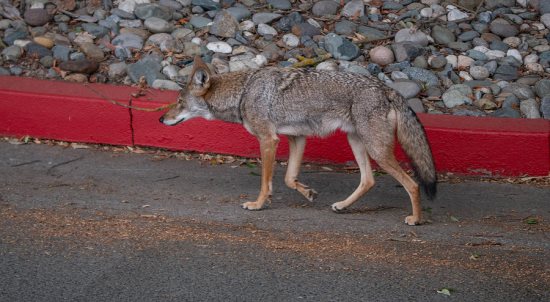| | Published March 3rd, 2021
| Search continues for coyote linked to Lafayette and Moraga attacks
| | | By Vera Kochan |  | | Bigstock images |
For the past eight months, a lone coyote has been attributed to five DNA confirmed attacks within Lafayette and Moraga which have taken place primarily at dusk or dawn.
 The first attack, on July 9, 2020, involved a 2-year-old boy near the parking lot restrooms at the Moraga Commons Park. A second attack, on Dec. 4, took place at the Campolindo High School stadium where a man was bitten while exercising. Another attack came on Dec. 15 behind Lafayette's Diablo Foods while an employee was taking a break. The next incident occurred on Feb. 16 when a 3-year-old girl was bitten during a walk with her mother two blocks away from Campolindo on Calle La Montana. The most recent attack on an adult male came Feb. 19 near the Kwik Stop in Lafayette.
The first attack, on July 9, 2020, involved a 2-year-old boy near the parking lot restrooms at the Moraga Commons Park. A second attack, on Dec. 4, took place at the Campolindo High School stadium where a man was bitten while exercising. Another attack came on Dec. 15 behind Lafayette's Diablo Foods while an employee was taking a break. The next incident occurred on Feb. 16 when a 3-year-old girl was bitten during a walk with her mother two blocks away from Campolindo on Calle La Montana. The most recent attack on an adult male came Feb. 19 near the Kwik Stop in Lafayette.
 According to California Department of Fish and Wildlife Captain Patrick Foy, the last attack almost went unreported by the victim until a female friend encouraged him to report it two days later. Since his wound was already administered to prior to the reporting, officials were lucky to find that his pants had not been washed or thrown away thereby enabling a DNA match.
According to California Department of Fish and Wildlife Captain Patrick Foy, the last attack almost went unreported by the victim until a female friend encouraged him to report it two days later. Since his wound was already administered to prior to the reporting, officials were lucky to find that his pants had not been washed or thrown away thereby enabling a DNA match.
 There was one additional animal attack at the Moraga Country Club on July 17, 2020, when a man was bitten while sitting around an outdoor fire pit with friends. "The incident at the Country Club was not able to be confirmed," stated Moraga Police Lt. Brian South. "The victim was not able to provide a description of the animal that bit him, and he was not able to meet with investigators until it was too late to take swab samples to compare DNA. That is why we are not including it in the list of confirmed attacks."
There was one additional animal attack at the Moraga Country Club on July 17, 2020, when a man was bitten while sitting around an outdoor fire pit with friends. "The incident at the Country Club was not able to be confirmed," stated Moraga Police Lt. Brian South. "The victim was not able to provide a description of the animal that bit him, and he was not able to meet with investigators until it was too late to take swab samples to compare DNA. That is why we are not including it in the list of confirmed attacks."
 Nearly one year ago, in Dublin Hills Regional Park, a 6-year-old girl was bitten by a coyote on her neck and ear while she was on a walk with her mother and brothers. It was reported that two other coyotes lingered nearby while she was being attacked.
Nearly one year ago, in Dublin Hills Regional Park, a 6-year-old girl was bitten by a coyote on her neck and ear while she was on a walk with her mother and brothers. It was reported that two other coyotes lingered nearby while she was being attacked.
 An Urban Coyote Research article stated, "Although coyotes live in family groups, they usually travel and hunt alone or in loose pairs. In this way they are different from wolves, which sometimes leads to the impression that coyotes do not form packs since they are usually seen alone. In addition to resident packs, the urban population also consist of solitary coyotes that have left packs and are looking to join groups or create their own territories." Solitary coyotes can be male or female and typically between 6 months to 2 years old.
An Urban Coyote Research article stated, "Although coyotes live in family groups, they usually travel and hunt alone or in loose pairs. In this way they are different from wolves, which sometimes leads to the impression that coyotes do not form packs since they are usually seen alone. In addition to resident packs, the urban population also consist of solitary coyotes that have left packs and are looking to join groups or create their own territories." Solitary coyotes can be male or female and typically between 6 months to 2 years old.
 The DFW continues to be the lead agency working in conjunction with the United States Department of Agriculture Wildlife Services, Contra Costa Animal Services and both Lafayette and Moraga police departments. A detailed survey of the terrain, game trail cameras and field tracking have been used to determine the coyote areas of activity and patterns. Numerous trap lines have been set up on private properties along with agency personnel periodically monitoring the areas around the clock. The padded gripping body traps resemble steel-jawed traps, but have rubber linings to reduce injuries. Foy explained that any trapped coyotes must eventually be euthanized and then tested for rabies, which requires a brain tissue sample, and can't be done with a live animal.
The DFW continues to be the lead agency working in conjunction with the United States Department of Agriculture Wildlife Services, Contra Costa Animal Services and both Lafayette and Moraga police departments. A detailed survey of the terrain, game trail cameras and field tracking have been used to determine the coyote areas of activity and patterns. Numerous trap lines have been set up on private properties along with agency personnel periodically monitoring the areas around the clock. The padded gripping body traps resemble steel-jawed traps, but have rubber linings to reduce injuries. Foy explained that any trapped coyotes must eventually be euthanized and then tested for rabies, which requires a brain tissue sample, and can't be done with a live animal.
 Researchers say that coyotes that traditionally inhabit wildlands are drawn to suburban environments where they can take advantage of water sources, pet food, household garbage cans, and even house cats and small dogs as prey. When asked if MPD has received reports of coyote attacks on pets, South replied, "I have no data on that other than anecdotal stories. There would be no way to know for sure that the coyote responsible for the human bites has ever attacked a pet."
Researchers say that coyotes that traditionally inhabit wildlands are drawn to suburban environments where they can take advantage of water sources, pet food, household garbage cans, and even house cats and small dogs as prey. When asked if MPD has received reports of coyote attacks on pets, South replied, "I have no data on that other than anecdotal stories. There would be no way to know for sure that the coyote responsible for the human bites has ever attacked a pet."
 Digital Commons at the University of Nebraska-Lincoln, published a report stating that "in the absence of harassment by residents, coyotes can lose their fear of people and come to associate humans with this safe, resource-rich environment. This problem is exacerbated by people who intentionally feed coyotes. In such situations, some coyotes have begun to act aggressively toward humans, chasing joggers and bicyclists, confronting people walking their dogs, and stalking small children."
Digital Commons at the University of Nebraska-Lincoln, published a report stating that "in the absence of harassment by residents, coyotes can lose their fear of people and come to associate humans with this safe, resource-rich environment. This problem is exacerbated by people who intentionally feed coyotes. In such situations, some coyotes have begun to act aggressively toward humans, chasing joggers and bicyclists, confronting people walking their dogs, and stalking small children."
 For more information on coyote safety visit www.keepmewild.org. To report a coyote sighting to either Lafayette or Moraga Police call: (925) 284-5010.
For more information on coyote safety visit www.keepmewild.org. To report a coyote sighting to either Lafayette or Moraga Police call: (925) 284-5010.
 As of March 1, no new developments were reported.
As of March 1, no new developments were reported. |
| | | | | | | | | | | | |




